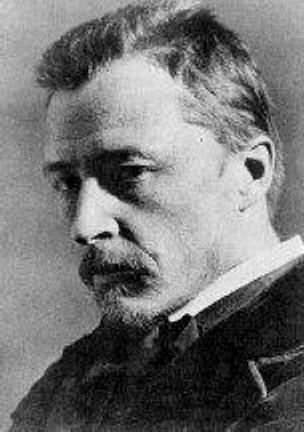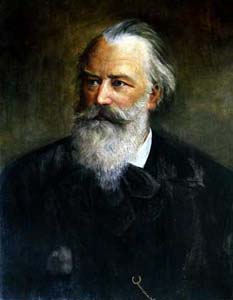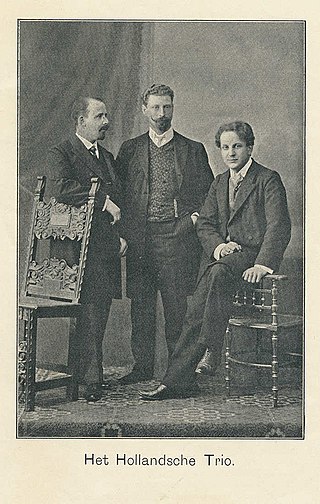

Coenraad Valentijn Bos (7 December 1875 - 5 August 1955) was a Dutch pianist, most notably as an accompanist to singers of lieder. [1] His peers such as Gerald Moore considered him the doyen of accompanists in his day. [2]


Coenraad Valentijn Bos (7 December 1875 - 5 August 1955) was a Dutch pianist, most notably as an accompanist to singers of lieder. [1] His peers such as Gerald Moore considered him the doyen of accompanists in his day. [2]
He was born in Leiden in 1875. He studied under Julius Röntgen and at the Berlin High School for Music. [3] [ better source needed ] He decided early to become an accompanist, a field of which he made a special study.
On 9 November 1896, in the presence of the composer, and still a month shy of his 21st birthday, he accompanied the Dutch baritone Anton Sistermans at the premiere of Brahms' Vier ernste Gesänge in Vienna. [4] [5]
In 1899 he founded The Dutch Trio (Das Holländische Trio) together with his Berlin-based countrymen Jacques van Lier and Joseph Maurits van Veen. The pianotrio was active for over ten years and acquired fame throughout Europe.
For many years he worked with singers such as Raimund von zur-Mühlen, Elena Gerhardt (USA tour 1920, Spanish tour 1928), Julia Culp, Frieda Hempel, Alexander Kipnis, [6] [ better source needed ] Gervase Elwes, Ludwig Wüllner and Helen Traubel (he accompanied Traubel on a world tour in 1945–46). [5]
He appeared with the 13-year-old Yehudi Menuhin in Berlin on 23 April 1929, [7] and they exchanged inscribed photographs of themselves in commemoration of the event [5] (Bos's gift to Menuhin is now in the Museum of the Royal Academy of Music [8] ).
He recorded lieder of Brahms, Reger, Schubert, Schumann and Wolf with Elena Gerhardt (1927–32). He figures prominently in the Hugo Wolf Society's Complete Edition 1931–38, accompanying Gerhardt, Herbert Janssen, Gerhard Hüsch, Alexandra Trianti, Elisabeth Rethberg, and Alexander Kipnis. [9] [10]
He died in Chappaqua, New York, United States on 5 August 1955, aged 79. [1] [3] [11]
He preserved his musical memories in "The Well-tempered Accompanist" (1949; co-written with Ashley Pettis). [12] [13]

Yehudi Menuhin, Baron Menuhin,, was an American-born British violinist and conductor who spent most of his performing career in Britain. He is widely considered one of the greatest violinists of the 20th century. He played the Soil Stradivarius, considered one of the finest violins made by Italian luthier Antonio Stradivari.

Hugo Philipp Jacob Wolf was an Austrian composer, particularly noted for his art songs, or Lieder. He brought to this form a concentrated expressive intensity which was unique in late Romantic music, somewhat related to that of the Second Viennese School in concision but diverging greatly in technique.

Dietrich Fischer-Dieskau was a German lyric baritone and conductor of classical music. One of the most famous Lieder performers of the post-war period, he is best known as a singer of Franz Schubert's Lieder, particularly "Winterreise" of which his recordings with accompanists Gerald Moore and Jörg Demus are still critically acclaimed half a century after their release.

Gerald Moore CBE was an English classical pianist best known for his career as a collaborative pianist for many distinguished musicians. Among those with whom he was closely associated were Dietrich Fischer-Dieskau, Elisabeth Schumann, Hans Hotter, Elisabeth Schwarzkopf, Victoria de los Ángeles and Pablo Casals.
Christian Ferras was a French violinist.

Robert Schumann's Violin Concerto in D minor, WoO 1, written in 1853, was his only violin concerto and one of his last significant compositions. It remained unknown to all but a very small circle for more than 80 years after it was written.
Alexander Kipnis was a Russian-born operatic bass. Having initially established his artistic reputation in Europe, Kipnis became an American citizen in 1931, following his marriage to an American. He appeared often at the Chicago Opera before making his belated début at the Metropolitan Opera in New York City in 1940.

Elena Gerhardt was a German mezzo-soprano singer associated with the singing of German classical lieder, of which she was considered one of the great interpreters. She left Germany for good to live in London in October 1934.

Baron Raimund von zur-Mühlen was a celebrated tenor Lieder singer who also became a famous teacher of singing, instructing many famous artists. His Lieder-interpretations are legendary.
Arabesque Records is an American record company and label specializing in jazz and classical music.

Ivor Newton was an English pianist who was particularly noted as an accompanist to international singers and string players. He was one of the first to bring a distinct personality to the accompanist's role. He toured extensively to all continents and appeared at music festivals such as Salzburg and Edinburgh. His career lasted over 60 years.

Jorge Chaminé is a Portuguese operatic baritone.

Vier ernste Gesänge, Op. 121, is a cycle of four songs for bass and piano by Johannes Brahms. As in his Ein deutsches Requiem, the texts are compiled from the Luther Bible. Three songs deal with death and the transience of life, while the fourth has an outlook of faith, hope and charity. Brahms composed the work in Vienna in 1896 and dedicated it to Max Klinger. The songs were premiered there in the presence of the composer by baritone Anton Sistermans and pianist Coenraad V. Bos. They have been recorded often by both female and male singers.

Anton Sistermans was a Dutch baritone during the late 19th to early 20th century. He is particularly notable for interpretations of lieder and oratorios. During his career, Sistermans premiered important compositions by Johannes Brahms and Gustav Mahler, and also had lieder dedicated to him by Hans Pfitzner, Eugen d'Albert and Alexander von Zemlinsky. In his later years, Sistermans served as a teacher at the Royal Conservatory of The Hague and conductor of a church choir in Rotterdam.
Collaborative piano is a discipline of music that combines piano performance, accompaniment, and music pedagogy.
Hartmut Höll is a German pianist and music professor.
Gordon Back is a Welsh pianist, teacher and music administrator, best known for his association with the violinist Yehudi Menuhin and the Menuhin Competition, of which he has been Artistic Director since 2002.
Hubert Giesen was a German pianist.
Hertha Klust was a German pianist.

The Dutch Trio was a musical ensemble for chamber music, consisting of Coenraad Valentijn Bos (piano), Joseph Maurits van Veen (violin) and Jacques van Lier (cello), that was very successful in Berlin between 1899 and 1910 because of their tasteful choice of repertoire and careful interpretation. The piano trio gave performances throughout Germany and also in Italy, France, the Netherlands and Denmark.